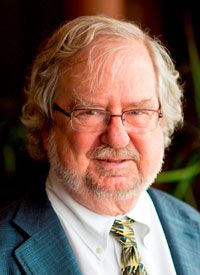James Allison Receives Distinguished Scientist Award From Association of American Cancer Institutes
James P. Allison, PhD, was recently presented with the Association of American Cancer Institutes (AACI) Distinguished Scientist Award in recognition of his extraordinary scientific accomplishments and contributions to cancer research.
James P. Allison, PhD

James P. Allison, PhD
James P. Allison, PhD, was recently presented with the Association of American Cancer Institutes (AACI) Distinguished Scientist Award in recognition of his extraordinary scientific accomplishments and contributions to cancer research, according to a news release from AACI.
Allison was presented with the award during the 2016 AACI/Cancer Center Administrators Forum (CCAF) Annual Meeting in Chicago on October 24, during which he delivered a presentation titled, “Immune Checkpoint Blockade in Cancer Therapy: New Insights, Opportunities, and Prospects for a Cure.”
Allison is a professor of Immunology, chair of the Department of Immunology, and previously, director of the Immunotherapy Platform at the University of Texas MD Anderson Cancer Center.
He proposed that immune checkpoint blockade might be a powerful strategy for the treatment of many cancer types and conducted preclinical experiments that show its potential.
His discoveries include the definition of the structure of the T cell antigen receptor, demonstration that the T cell molecule CD28 provides costimulatory signals necessary for full T cell activation, and the identification of the inhibitory checkpoint molecule CTLA-4, which inhibits activated cells.
Allison was also involved in the development of ipilimumab (Yervoy), which received FDA approval in 2011 for the treatment of metastatic melanoma. In 2014, the FDA approved 2 antibodies to PD-1, a related immune checkpoint, for the treatment of melanoma. The following year, the FDA approved 5 additional CTLA-4 and PD-1 antibodies, and combinations of both, for the treatment of a variety of indications, including melanoma, lung, and kidney cancer. The development of immune checkpoint blockade transformed cancer treatment and effectively saved the lives of thousands of patients with cancer.
Previous recipients of the AACI Distinguished Scientist Award include Lewis Cantley, Brian Druker, Lee Hartwell, Mary-Claire King, Timothy Ley, Janet Rowley, Stuart Schreiber, Margaret R. Spitz, Bert Vogelstein, Robert Weinberg, and Irving Weissman.
Allison obtained his BS and PhD from The University of Texas at Austin. In 1974, he joined the faculty of The University of Texas MD Anderson Cancer Center Science Park in Smithville, Texas after a postdoctoral fellowship at Scripps Clinic and Research Foundation. He later joined the University of California, Berkeley, in 1984 as a professor of Immunology. There, he served as director of the Cancer Research Laboratory, head of the Division of Immunology in the Department of Molecular and Cell Biology, and co-chair of the Department of Molecular and Cell Biology.
In 2004, Allison joined Memorial Sloan Kettering Cancer Center in New York City as professor of Immunology, chair of Immunology and director of the Ludwig Center for Cancer Immunotherapy, before moving to MD Anderson Cancer Center in 2012.
Allison’s past honors and awards include the Lasker-DeBakey Clinical Medical Research Award in 2015, Breakthrough Prize in Life Sciences in 2014, Tang Prize for Biopharmaceutical Science in 2014, Louisa Gross Horwitz Prize in 2014, and Canada Gairdner International Award in 2014.